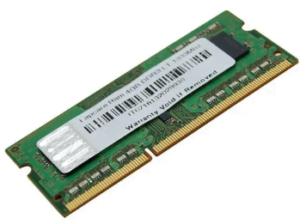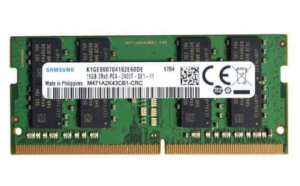RAM (Random Access Memory) is a crucial component in laptops, enabling them to run multiple programs simultaneously and handle complex tasks efficiently. When it comes to laptops, space is often a limiting factor, requiring specialized RAM modules to fit within the compact confines of these devices.
Laptop RAM modules are called Small Outline Dual In-Line Memory Modules (SO-DIMM). They are designed to be smaller and thinner than standard desktop RAM modules, which are called DIMMs (Dual In-Line Memory Modules). This is because laptops have less space available for components compared to desktops.
SO-DIMMs have the same functionality as DIMMs, but they have fewer pins and a smaller form factor. They are also typically lower in voltage and power consumption than DIMMs, as laptops need to conserve battery life.
Which type of RAM modules are designed for the space limitations of laptops?
| No | which type of RAM modules are designed for the space limitations of laptops? |
| 1 | SODIMMS |
| 2 | SRAM |
| 3 | SIMMs |
| 4 | DIMMs |
• SODIMMs
• SRAM
• SIMMs
• DIMMs
Explanation: SRAM is not used for desktops or laptops as a RAM module, but as L1 cache inside the CPU. SIMMs were replaced by DIMMs on desktops as RAM modules.
which type of RAM modules are designed for the space limitations of laptops? Table
Here is a table that compares SO-DIMMs and DIMMs:
| Feature | SO-DIMM | DIMM |
|---|---|---|
| Size | Smaller and thinner | Larger and thicker |
| Pins | Fewer pins | More pins |
| Voltage | Lower voltage | Higher voltage |
| Power consumption | Lower power consumption | Higher power consumption |
Beyond the size and power differences, here are some additional points about SO-DIMMs:
Capacity and Speed:
- While generally smaller, SO-DIMMs offer capacities comparable to DIMMs, reaching up to 16GB per module as of today.
- They also support similar speeds, with DDR4 SO-DIMMs reaching speeds up to 3200MHz, catering to demanding applications on laptops.
which type of RAM modules are designed for the space limitations of laptops?Compatibility
Compatibility:
- SO-DIMMs are not interchangeable with DIMMs due to their different sizes and pin configurations.
- Laptops have specific SO-DIMM slots designed to accept only compatible modules. It’s crucial to check your laptop’s manual or manufacturer’s website to determine the type of SO-DIMM it supports, including factors like:
- DDR generation (DDR3, DDR4, etc.)
- Maximum supported capacity per module
- Speed (MHz)
Upgrading:
- Many laptops allow upgrading their RAM by providing one or more accessible SO-DIMM slots. This can be helpful for enhancing performance, especially for tasks like multitasking, video editing, or gaming.
- Upgrading is generally straightforward, though consulting the manual or online guides for your specific laptop is recommended.
Other Applications:
- SO-DIMMs are not limited to laptops. They are also used in other compact devices like:
- Mini PCs
- Small form factor desktops
- All-in-one (AIO) computers
- Networking equipment
I hope this additional information provides a more comprehensive understanding of SO-DIMM RAM modules.
which type of RAM modules are designed for the space limitations of laptops? FAQ
Top 10 Affiliate Programs | Earn $100 Per Day
- How much RAM do I need for my laptop?
- The amount of RAM you need depends on your usage requirements. For basic tasks, 8GB is usually sufficient, while power users may benefit from 16GB or more.
- Are there any risks associated with upgrading laptop RAM?
- While RAM upgrades are generally safe, improper installation or incompatible modules can damage your laptop. It’s essential to follow proper procedures and ensure compatibility before proceeding.
- Can I mix different types of RAM in my laptop?
- It’s not recommended to mix different types or speeds of RAM in a laptop, as this can lead to compatibility issues and potential performance degradation.
- How often should I upgrade my laptop’s RAM?
- The frequency of RAM upgrades depends on your usage patterns and the lifespan of your laptop. If you notice performance slowdowns or reach the limits of your current RAM capacity, it may be time to consider an upgrade.
In today’s fast-paced world, laptops have become indispensable tools for both work and leisure. As technology advances, laptops are becoming increasingly compact and lightweight, making them more portable than ever before. However, this trend towards smaller form factors presents unique challenges, particularly when it comes to internal components like RAM (Random Access Memory). In this article, we will explore which type of RAM modules are specifically designed to meet the space limitations of laptops.
DDR3 RAM: This type of RAM has been widely used in laptops for several years. While it offers decent performance, it tends to consume more power compared to newer alternatives.

DDR4 RAM: DDR4 RAM is the successor to DDR3 and offers improvements in both speed and energy efficiency. It is commonly found in modern laptops and provides better overall performance.
Characteristics of RAM Modules Designed for Space Limitations
RAM modules designed for laptops with space limitations typically share several key characteristics that make them well-suited for compact environments.
Reduced Power Consumption: To maximize battery life and minimize heat generation, RAM modules for laptops are designed to consume minimal power while still delivering excellent performance.
Optimized Performance: Despite their small size, these RAM modules are optimized to deliver fast and reliable performance, ensuring smooth multitasking and responsive computing experiences.
Benefits of Using RAM Modules Designed for Space Limitations
Choosing the right RAM modules for laptops can have a significant impact on overall performance and user experience. Some of the benefits of using RAM modules designed for space limitations include:
Enhanced Battery Life: Low-power RAM modules help extend battery life, allowing users to work or play for longer periods without needing to recharge.
Improved Heat Management: By consuming less power and generating less heat, these RAM modules contribute to better heat management within laptops, reducing the risk of overheating and thermal throttling.
Better Overall System Performance: Compact and efficient RAM modules ensure that laptops can handle demanding tasks with ease, providing a smooth and responsive computing experience for users.
Factors to Consider When Choosing RAM for Laptops
When selecting RAM for a laptop, there are several factors to consider to ensure compatibility and optimal performance:
Compatibility with Laptop Specifications: It’s essential to choose RAM modules that are compatible with the specific make and model of the laptop. Consult the manufacturer’s specifications to determine the supported RAM type, speed, and capacity.
Budget Considerations: While high-performance RAM modules may offer superior performance, they often come with a higher price tag. Consider your budget constraints when selecting RAM for your laptop and choose the option that offers the best balance of performance and affordability.
Future-Proofing: As technology continues to evolve, it’s wise to invest in RAM modules that offer room for future expansion. Choose modules with higher capacities and faster speeds to ensure that your laptop remains capable of handling upcoming software updates and advancements.
Conclusion
In conclusion, selecting the right RAM modules is crucial for optimizing the performance and efficiency of laptops, especially considering the space limitations inherent in portable devices. By choosing RAM modules designed specifically for space constraints, users can enjoy enhanced battery life, improved heat management, and better overall system performance. When shopping for RAM for your laptop, be sure to consider factors such as compatibility, budget, and future-proofing to ensure a seamless computing experience.
Unique FAQs
What is the difference between DDR3 and DDR4 RAM?
DDR4 RAM offers improvements in speed and energy efficiency compared to DDR3, making it a better choice for modern laptops.Can I upgrade the RAM in my laptop?
In many cases, yes. However, it’s essential to check your laptop’s specifications to ensure compatibility with the desired RAM upgrade.Are LPDDR4 RAM modules backwards compatible with older laptops?
LPDDR4 RAM modules may not be compatible with older laptops that were designed for DDR3 or DDR4 RAM. Always check compatibility before purchasing.How much RAM do I need for everyday computing tasks?
For basic tasks like web browsing, email, and document editing, 8GB of RAM is usually sufficient. However, heavier multitasking or gaming may require 16GB or more.What is the lifespan of RAM modules in laptops?
RAM modules typically have a long lifespan and can last for several years with proper care and usage.


